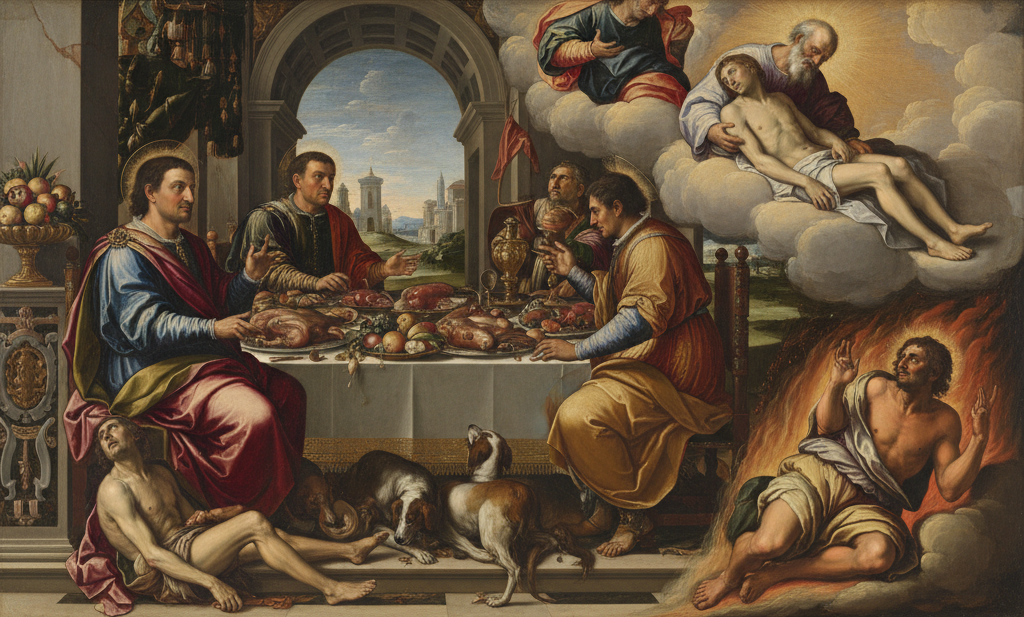26th Sunday in Ordinary Time - Year C - The Cry of the Poor & ‘Chant Mass’
Friends, the Gospel parable this Sunday (Lk. 16:19-31) highlights the gulf between the wealthy and the poor. It concerns two individuals alive in this world, and then alive after death in the next. The human players are described in vivid, graphic, perhaps exaggerated terms. The first who remains anonymous, though sometimes he is referred to as Dives (which in Latin means rich), is extremely wealthy. This finds expression in his highly fashionable dress: he habitually wears expensive purple outer garments or woolen mantles, purple being the color of royalty and the elite, and also fine linen, usually a luxury import. All these were signs of the highest opulence.
His counterpart is a poor man named Lazarus who has been left (or 'dumped') outside the gateway of his mansion, a destitute beggar, probably crippled, clearly visible. He is covered with sores, probably ulcers, and obviously quite ill. He is also hungry, and longs to eat the scraps that might fall from the rich man's table, which means the pita bread which the banquet guests used as napkins and then threw on the floor for the dogs to eat. His longing goes unrequited. The dogs scavenging in the neighborhood come to lick his sores, adding to his indignity. The rich man, however, is aware of Lazarus, but fails to respond to his needs or offer help.
Death suddenly intervenes for both of them and their situations are dramatically reversed. This time it is Lazarus who is mentioned first. Without mention of a funeral, he is carried immediately by angels into Abraham's embrace. The rich man has a decent burial, as would be expected, but surprisingly, he is now to be found in Hades, a place of torment. Instead of his gourmet feasting, he is wracked with thirst; instead of fashionable clothes, he is engulfed by flames.
Earlier in the Gospel, in the Sermon on the Plain in Luke's version of the Beatitudes, Jesus states: 'Blessed are you who are poor now, for yours is the kingdom of God. Woe to you who are rich, for you have received your consolation.' In the parable, Abraham renders explicit the divine reversal promised in that Sermon on the Plain: "My son, remember that during your life you had your fill of good things, just as Lazarus his of bad. Now he is being comforted here while you are in agony." There are also echoes of the words of Mary in her Magnificat hymn, when she speaks of God scattering the proud in the thoughts of their hearts, lifting up the lowly, filling the hungry with good things, and sending the rich away empty.
The people of Jesus' time believed that riches were a sign of God's favor, and poverty an indication of God's disfavor. But Jesus says the opposite. God is on the side of the poor and hungry and struggling. Jesus isn't against us having things, but he expects us to use what we have for the good of others too, to be out-going, to be compassionate and generous and caring, not closed in on ourselves too much. And that ultimately was the problem of the man in the parable story.
We’re honored to share our latest video, 'Chant Mass', a traditional Mass setting with parts sung in both Latin and English, as handed down through the Graduale Romanum. This setting invites prayerful reflection through the sacred rhythms of Gregorian chant, uniting ancient tradition with living faith. This is also the Mass setting we normally sing during Lent at our Parish (except for the Gloria, of course!).
Video can be watched by clicking here or by clicking on the thumbnail below.
